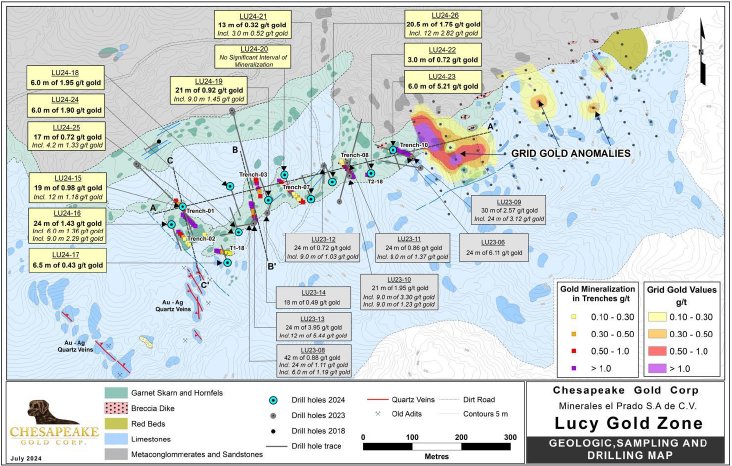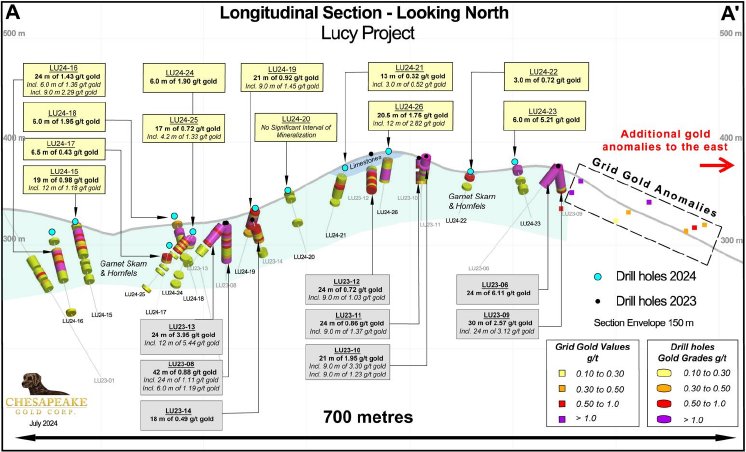Jean-Paul Tsotsos, Interim Chief Executive Officer, commented, “The positive results gathered during this exploration phase continue to add cadence to the robust nature of the mineralized system at Lucy. During this exploration phase, we successfully intersected more high-grade gold mineralization starting from surface, extended the gold mineralized zone from 500 to 700 metres, and the corridor remains open along strike in either direction and at depth. Encouraging soil and rock sampling results have accelerated a detailed mapping program over a larger footprint of the property with additional geochemistry sampling activities also underway. These additional results will be integrated into the next phase of drilling to further uncover the value of this important discovery.”
Phase 2 Exploration Overview and Future Plans
The 939-metre 12-HQ core drill program successfully extended the known gold-bearing skarn system and filled previous gaps along the mineralized corridor. Drill holes LU24-15 to LU24-17, LU24-24, and LU24-25 added another 150 metres to the gold mineralized corridor along strike to the Southwest and provided early indications of the dip direction of the gold mineralization below the surface. Drill holes LU24-19 to LU24-23 and LU24-26 filled in the gaps and delineated additional mineralization within the known gold zone. The gold mineralization across this expanded corridor continues to display retrograde quartz-calcite, iron oxides, sulphide veinlets and stockwork hosted within garnet and pyroxene skarn and hornfels with zones altered to actinolite and other silicates. Only one hole in the 12-hole program missed the mineralized zone but provided valuable insights into the direction of the mineralization beneath the surface.
In addition to the drilling, a 225-metre by 450-metre area to the Northeast of the mineralized corridor was subject to soil and rock sampling for geochemical analysis. Results from the 101 geochemical grid samples traced a continuous 150-metre-long gold anomaly extending Northeastward along trend from the drilled mineralized corridor. Further to the Northeast are another set of gold anomalies that warrant additional evaluation. These results indicate that the gold-bearing skarn corridor continues to the Northeast, and a detailed follow-up mapping, sampling and trenching program is underway. Based on the success of this exploration technique, a larger 200+ soil and rock geochemistry sampling program has been initiated to cover a larger portion of the Lucy property surrounding the gold mineralized corridor.
Moreover, a 63-line-kilometre ground magnetics survey over the entire property was also completed during this exploration phase. This survey is being integrated with direct magnetic readings gathered from drill core and a past induced polarization (“IP”) survey collected over the property in 2017-2018. Early interpretations of these results have outlined several coincident magnetic and IP anomalies that warrant follow-up exploration to determine their relationship with the Lucy gold-bearing skarn system.
Looking forward, Chesapeake is working towards completing the detailed mapping, the expanded soil and rock geochemistry program, additional metallurgical testwork and several early-stage studies to gather mineralogical, petrographic, and geo-structural data to further understand the scope and scale of the Lucy system. Once this work is complete and integrated, a more extensive next phase of core drilling and exploration is planned.
Additional geological cross-sections, selected core photos, management site visit images from March 2024, and the complete assay data table are available here.
Lucy Project Overview
The Lucy project comprises 483 hectares and is 5 kilometres from a paved highway. Lucy claims were staked and acquired by Chesapeake in 2017 and 2018. Mapping, trenching and channel sampling in 2021 and 2022 identified a gold-bearing skarn system. In October 2023, the Company announced the discovery of a high-grade gold-bearing skarn system from a Phase 1 drill program (See press release dated October 3, 2023). Furthermore, in February 2024, the Company reported that initial metallurgical test results achieved up to 97% gold recoveries in standard bottle roll tests and generally supports that the Lucy mineralization is readily treatable with a standard CN tank leach in a Carbon in Leach/Carbon in Pulp type process (See press release dated February 13, 2024).
For Further Information:
For more information on Chesapeake and its Metates and Lucy Projects, please visit our website at www.chesapeakegold.com or contact Jean-Paul Tsotsos at invest@chesapeakegold.com or +1 778 731 1362.
Please join us at our webinar on Thursday, July 11th, at 8:00 AM PST (11:00 AM EST) using the link below.
Lucy Project Exploration Update Webinar
Neither TSX Venture Exchange nor its Regulation Services Provider (as that term is defined in policies of the TSX Venture Exchange) accepts responsibility for the adequacy or accuracy of this news release.
Sample Preparation, Analysis and QA/QC Program
All the assays reported by Chesapeake in this news release are from HQ drill cores which were logged and sampled in a secure storage facility. HQ core was cut using disc rock saws, and a representative one-half sample was selected for assay. Core samples were sent to the ALS Global facility in Zacatecas City, Mexico, for preparation of assay pulps which were subsequently sent to ALS labs in Vancouver, Canada, for analysis.
All core samples, generally at 3-metre sample intervals, were prepared using a method whereby the entire sample was crushed to 90% passing -2mm, a split subsample of 1000 g was pulverized to better than 85% passing 75 microns and then a 250 g pulp was taken.
Samples were analyzed for gold using 50 g fire assay fusion with an ICP finish (Method Au-ICP22). Silver and other elements were analyzed by 4 acid digestion with an ICP finish (Method ME-ICP61). Gold (>5 ppm) and silver (>100 ppm) over limits were analyzed by fire assay and gravimetric finish.
Certified standards and blanks from CDN Resource Laboratories were inserted into the sample stream as part of the sampling protocol for the QA/QC program.
Qualified Persons
Alberto Galicia, P.Geo, Vice President Exploration and Gary Parkison, CPG, Vice President Development, are Qualified Persons as defined by NI43-101 and have reviewed and approved the technical information in this release..
About Chesapeake
Chesapeake Gold Corp’s flagship asset is the Metates Project (“Metates”) located in Durango State, Mexico. Metates hosts one of the largest undeveloped gold-silver deposits in the Americas[1] with over 16.77 million ounces of gold at 0.57 grams per tonne (g/t) and 423.2 million ounces of silver at 14.3 g/t within 921.2 million tonnes in the Measured and Indicated Mineral Resource category and a further 2.13 million ounces of gold at 0.47 g/t and 59.0 million ounces of silver at 13.2 g/t within 139.5 million tonnes in the Inferred Mineral Resource category. See the technical report titled “Metates Sulphide Heap Leach Project Phase I” dated January 13, 2023, and news release dated February 23, 2023.
Forward-looking Statements
This news release contains “forward-looking statements” within the meaning of Canadian securities legislation. Such forward-looking statements include, without limitation, statements with respect to the Company’s strategic plans, timing and expectations for the Company’s exploration and drilling programs at the Company’s Lucy project, estimates of mineralization from drilling, geological information projected from sampling results and the potential quantities and grades of the target zones.
Such forward looking statements or information are based on a number of assumptions, which may prove to be incorrect. Assumptions have been made regarding, among other things: the conditions in general economic and financial markets; the price of gold and silver; the availability and costs of mining equipment and skilled labour; accuracy of assay results; geological interpretations from drilling results, timing and amount of capital expenditures related to drilling programs; performance of available laboratory and other related services; future operating costs; and the historical basis for current estimates of potential quantities and grades of target zones.
The actual results could differ materially from those anticipated in these forward looking statements as a result of risk factors, including the timing and content of work programs; results of exploration activities and development of mineral properties; the interpretation and uncertainties of drilling and testing results and other geological data; receipt, maintenance and security of permits and mineral property titles; environmental and other regulatory risks; project costs overruns or unanticipated costs and expenses; availability of funds; failure to delineate potential quantities and grades of the target zones based on historical data, and general market and industry conditions.
Forward-looking statements are based on the expectations and opinions of the Company’s management on the date the statements are made. The assumptions used in the preparation of such statements, although considered reasonable at the time of preparation, may prove to be imprecise and, as such, readers are cautioned not to place undue reliance on these forward-looking statements, which speak only as of the date the statements were made. The Company undertakes no obligation to update or revise any forward-looking statements included in this news release if these beliefs, estimates and opinions or other circumstances should change, except as otherwise required by applicable law.
[1] Mexico’s biggest undeveloped gold deposits. Bnamericas. Published Tuesday, November 24, 2020.



